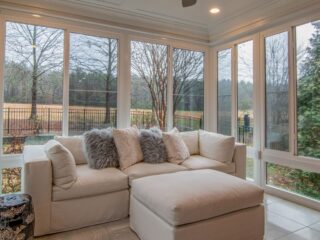
Maintaining a healthy home starts with clean air. Air filters play an important role in improving your indoor air quality by trapping pollutants like dust, pollen, and smoke. This guide will walk you through the essentials of air filters, why they matter, and how to choose the right one. From understanding MERV ratings to exploring different types of filters, we’ll help you find the best option for your needs.
The Basics of Air Filters
What Are Air Filters?
An air filter is a device that helps promote clean indoor air quality (IAQ) for your home. Air filters work by pulling in air and filtering it by trapping pollutants, such as dust, pollen, and smoke, in the media and then pushing out clean healthy air.
Why Air Filters Matter
Air filters are vital for your health. While we can’t fully control the air quality outside we can control the air quality inside. Long exposure to poor air quality can lead to many health conditions such as asthma, respiratory disease, neurological disorders, and even cancer. And if you already have these health conditions they will only make it worse, leaving you to suffer more. Air filters are like a barrier from all the harmful pollutants in the air lessening your chance of health concerns.
Understanding MERV Ratings
What is MERV?
MERVrating stands for Minimum Efficiency Reporting Value, which is a scale to report the effectiveness of air filters. This scale was designed in 1987 by the American Society of Heating, Refrigerating, and Air-Conditioning Engineers and is still used to this day to properly measure how well an air filter can clean air pollutants.
Choosing the Right MERV Rating
Choosing the right air filter for you depends on you and your preferences but here’s a short guide on what each MERV rating level can do.
– Low MERV(1-4): Basic filtration, large particles.
– Medium MERV (5-8): Improved air quality, common residential use. (Most companies sell air filters at MERV ratings 7 and higher)
– High MERV (9-12): Enhanced filtration, suitable for homes with pets or allergies.
– Very High MERV (13-16): Superior filtration, capturing finer particles.
– HEPA Filters (MERV 17-20): Maximum filtration, ideal for sensitive environments.
Types of Air Filters
Fiberglass Filters
Fiberglass air filters have a media that is made from spun glass. These filters are able to capture large particles from the air and have MERV ratings between 1 and 4. These types of air filters are cheaper too but you will spend more money since they need to be replaced more often. They also can’t capture most pollutants in the air, that’s why these are not the most popular option.
Pleated Filters
Pleated air filters are typically made up of cloth or paper and are folded into a series of small pleats which increases the surface area. You can get these filters in most MERV ratings and can capture most, if not all, air pollutants. These filters are very popular.
HEPA Filters
HEPA air filters stand for High-Efficiency Particulate Absorbing filters and are typically made up of plastic fibers (polypropylene), fiberglass, or borosilicate glass fibers.
These filters have a MERVrating of 17 or higher which traps 99.97% of air pollutants but you have to be careful of high MERV ratings because they often can restrict your air flow. Most house’s HVAC systems are only equipped to have MERV ratings as high as 13.
Electrostatic Filters
Electrostatic air filters are made up of a polyurethane and polypropylene blend which creates the static charge that traps the air particles. Typically these filters are reusable and just need to be cleaned often to work properly. They also have a MERV rating between 8 and 10 so they are good at capturing small and big particles.
Activated Carbon Filters
Activated carbon air filters, also known as activated charcoal filters, are made with charcoal that is treated with oxygen. These filters are not only good at collecting air pollutants, with a common MERV8rating, but also are great at capturing odors in the air.
Selecting the Ideal Filter for Your Needs
Allergies and Asthma
Pleated air filters are best for people with allergies and asthma due to their larger surface area. With that in mind, a MERV rating of at least 11 is also recommended, a higher MERV rating captures smaller pollutants like dust and pollen.
Pet Owners
Pet owners listen up, we love our furry friends but sometimes we need to breathe clearly. Activated carbon air filters with a MERV rating between 8 and 13 are great for pet owners, they also help with odor control.
Time to Pick the Right Air Filter
Choosing the right air filter is important for maintaining clean and healthy indoor air. By understanding the basics of air filters, MERV ratings, and the different types available, you can select the best option for you and your home. Whether you’re dealing with allergies or pets, or simply want to improve your air quality, the right air filter can make a significant difference. Invest in a quality air filter to ensure you and your family breathe easier and live healthier







